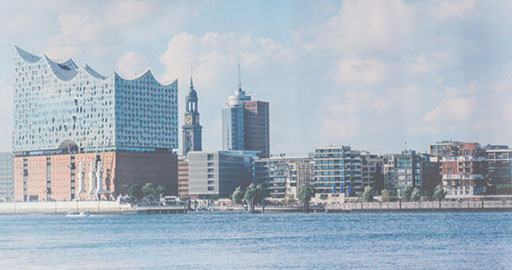Globalization, digital transformation and an increase in industry convergence: We support our clients in overcoming new challenges today.
Maximum customer orientation, cost-optimized business models and Time-to-Market are essential elements for a company to remain competitive while establishing itself successfully in a market.
We know the national and international markets and have a sense for current developments and new trends.
Services & Outsourcing
The competitive constraints and cost pressure in numerous industries is increasingly causing companies to outsource some or all of their operational services in the fields of purchasing, finance, sales, customer service, IT or even human resources.
We are specialized in supporting these companies in finding the right sourcing strategy. In addition to the identification of cost saving potentials, we also examine possibilities for quality and performance improvement as well as the implementation of new business models to increase sales. We thereby manage the challenges of both the client and the service provider.
The current progress of the outsourcing industry shows an obvious national and international trend. This is determined by the increase in mergers and acquisitions (M&A) as well as an increased offer of digital solutions in customer contact management. Major new international competitors are now present in the German market or are planning to establish a footprint in Germany.
With over 20 years of experience in this market, we have access to an extensive network of companies and partners. We would be happy to show you how you can benefit from this, too.
Energy Industry
The energy industry is undergoing a fundamental remodeling and change process, which continues to present established market competitors with major challenges. Decentralized energy generation in combination with market liberalization and unbundling has turned many traditional market logics upside down.
Digitization, increased automation along the stages of the value chain, intelligent routing and metrology, bidirectional communication between network components, analytics and big data are fundamentally changing business models and processes. This creates new opportunities – both for established companies and new competitors.
Major changes, disruptions and truly successful business models have only initially been developed and implemented by very few market players. Not only do we bring new ideas for future success in this area, but also many years of experience.
Banks, Insurance Companies and Financial Services
Hardly any other industry is faceing such sustained challenges from digitization as the financial sector. Numerous banks and insurance companies are investing hundreds of millions of euros in the modernization of their IT infrastructure. Here the focus lies on downsizing internal processes and outsourcing services that are no longer part of their core business, as well as on omnichannel consulting and customer care to improve the customer experience.
Alongside meeting increasingly strict regulatory and legal requirements (keyword: Basel III or Solvency II), companies in the financial sector are faced with additional challenges from a completely different angle: Regaining the trust of their customers. Customers’ requirements for the products and services offered by their bank or insurance company are changing progressively, especially because they work professionally with new media and expect intelligent, personalized services. Young financial technology companies (Fintechs) and Internet corporations that have their own payment solutions, are putting additional pressure on established market players with alternative, cost-effective and innovative business concepts.
Because of this, a significantly higher strategic and structural flexibility of their own business models is required. Banks, insurance companies and financial service providers must therefore become more innovative, agile and adaptable. As specialist for integrated customer management with a profound knowledge and understanding of the challenges and requirements of the financial industry, we bring the necessary expertise to the creation and evaluation of innovative solution concepts for digitization as well as for sales and customer service.
Technology, Media & Telecommunications
From Big Data to the Internet of Things and from artificial intelligence to ultra-fast connectivity. Companies in the technology, media and telecommunications (TMT) industries are at the front of economic and social innovation processes. The smartphone acts as a mediator between a person, object and the Internet. The digital revolution provides the market with good opportunities to grow. But rapid technological transformation is forcing companies to constantly reposition themselves.
Processes, markets and entire business models in these sectors are constantly changing; large volumes of structured and unstructured data often form the basis for new products and services. Telephones are no longer used only for conversations (voice); the market today consists of a broad spectrum of data-based telecommunication services. Companies from the technology and media industries benefit particularly from AI technologies. They use it to analyze large amounts of data, automate processes and improve customer contact.
We help to expand innovative business models in a highly dynamic industrial environment which is distinguished by the quick access of new market participants and business models, as well as strong competitive pressure and extensive regulation.
Trade, eCommerce & Logistics
Amazon, Zalando and Co. have not only changed the shopping behavior of consumers in last couple of years. The change in customer and purchasing behavior forces manufacturers, (wholesalers) merchants and service providers to develop well thought-out eCommerce solutions in order to meet customer requirements today and in the future.
At the same time, the stationary trade is currently in a way experiencing a renaissance. Consumer’s personal impressions at the point-of-sale and viral recommendations through social networks influence the consumer’s omnichannel buying decision-cycle. Digital channels are gradually shaping the shopping and brand experience, despite the dangers of data misuse on the Internet. Digital sales and communication channels are also becoming more and more important for corporate and business customers.
The increase of e-commerce in all areas makes it also necessary to adapt logistical processes. Same-day or even same-hour deliveries no longer require large warehouses. The digitalization of consumption means that products and goods in warehouses have an even shorter shelf life. Small-scale solutions, that enable fast response times, are increasingly in demand. Rapid urbanization requires inner-city logistics solutions, e.g. alternative delivery systems such as electric vans or bicycles, starship robots or drones, which deliver from so-called city hubs or micro-depots.
Retailers, consumer goods manufacturers and logistics companies must accept this challenge, develop new, adaptable business models and adjust the online and offline sales and customer services. Because today – more than ever – it is the customer who determines which business models will prove to be successful in the future. We will help you with the digital change.
Automobile Industry & Manufacture
The industrial production is undergoing a profound change: digital technologies, intense global competition and dissolving industry boundaries are putting proven business models under pressure and forcing production companies to constantly adapt and innovate. Technological transformation, shaped by the Industry 4.0 and the Internet of Things, a changing customer structure and cyclicity, caused by economic circumstances, are almost a part of their basic configuration.
The automobile industry has to deal with alternative mobility concepts, as well as with mechanical engineers with additional services in order to provide a full-service offer, while establishing the Internet as a sales channel. This all applies to the entire manufacturing industry. Electromobility is merging the boundaries with other sectors such as the energy industry or information technology. For example, the remote inquiry of a battery charging status and the search for free charging points results in new service provisions for the customer as added value. This can be linked to a range of additional information and entertainment offers.
Therefore, new business areas are developing around the traditional manufacturing core – the production, marketing and financing of vehicles, capital goods or products. We see ourselves as a future-oriented partner of the automobile industry and the automotive sector, successfully mastering both current and future challenges in sales and customer service. In addition to continuously observing the development of the manufacturer market, it is an essential part of our day-to-day operations to identify further potential in customer service for our clients and to lift it up to a higher value-added level.
Startups, Family & Medium-Sized Businesses
The boundaries of a business area, which is comprised of medium-sized companies, are becoming fluid. However, this term includes almost all German companies. Statistically, all companies throughout Germany with less than 500 employees are considered to be a middle-sized company. De facto, however, newly founded and rapidly growing micro-enterprises and much larger companies, as long as they are owner-managed, are also included.
The Mittelstand is Germany’s innovative, technological and economic engine. In addition to adapting flexibility and speed to markets, research and innovation are the keystones of success. Numerous companies act as so-called “hidden champions” in regional, national and global existing and functioning niche market. The successful medium-sized companies are much more agile, dynamic, risk-oriented and willing to change than is generally thought of.
However, whether they are start-ups, family-owned businesses or SMEs: digitization, internationalization and a shortage of skilled workers also present these companies with many challenges. Young founders bring creativity, courage and the ability to implement ideas, but on a scalable manner, they often lack the opportunity to sell their products and services on the market themselves. Older entrepreneurial families hand over the management in whole or in part to managers from outside the family due to a lack of regulated company succession.
External managers bring more “manpower” and additional know-how to the management and represent new, non-owner views and positions. Owner-managed companies have very special needs and place the highest demands on themselves and their environment. We are specialized in adapting these special economic conditions.
Not only does optivendo support startups as well as medium-sized and family-run companies with general questions regarding the management and strategy, but also with pragmatic and success-oriented questions regarding more fundamental issues of business operations and sales.
International Companies
There are many reasons for internationalization and market entry in a new country: For some companies it is the development of new sales markets, for others it is among other things cost-motivated reasons. But expansion should not be taken for granted. What works well in the domestic market is not automatically successful abroad. This applies to German companies that want to grow abroad or want to relocate parts of their production or certain services for cost reasons, as well to foreign companies that want to go the other way and enter the German market.
Each internationalization project is a challenge in itself. There is no general valid standard plan and requires, therefore, a procedure tailored to a company, the market and the industry. In addition to a few basic requirements that a company must fulfill in order to be able to successfully tackle a foreign expansion or market entry in general, a number of questions must be answered regarding the right strategy and implementation: Should the company manage a central headquarter or establish various decentralized country organizations? Is the expansion to be promoted by organic growth or should an established company be bought in the target country?
In the end, the company has to still face tax and legal regulations that can be more complex and multi-layered than in the domestic country. The most important key factors for successful international expansion include corporate factors, human resources, financial resources and cultural, administrative and logistical factors. The different cultural conditions have to be taken into account. With our many years of experience in finding, establishing and managing locations for German companies in Europe and other parts of the world, we know which critical success factors need to be considered and how to manage them. In particular, we also help foreign companies realize their successful market entry in Germany.
Housing Industry
The housing industry is strongly characterized by technical modernization. In addition to exploiting synergies with cable network operators, it also merges with the energy sector. Housing will become smarter in the future and networking will be further expanded with new technologies.
optivendo has identified the housing industry as a promising growth market and has therefore entered the housing industry with a comprehensive full-service consulting offer. First experiences in working with energy providers shows that decision-makers in the housing industry are progressively choosing an all-round carefree package in energy and heat supply, including additional services such as utility billing or legionella testing. Request for electromobility, photovoltaics, tenant electricity and other smart services complement the product range.
optivendo offers strategic and pragmatic top management consultancy at the highest level. We live up to our claim when it comes to increasing short-term and sustainable sales and operational performance of the companies and organizations we consult. We see ourselves as creators among the consultants. Our approach begins with the use of the latest market knowledge and market potential, which we keep up to date.
We serve the entire range of sales and operational challenges to top management. As well as strategic and organizational aspects including operational implementation issues – systematic and structured sales, operational processes and performance-oriented, technically innovative and digital – are the focus of our attention.
With innovative solutions, we support senior executives, managing directors and Heads of Departments in achieving their goals. Our technical expertise lies primarily in the sales of highly complex products and services.
Our operational process expertise in project management is applied to customer service, technical support and purchasing. As a specialist in energy efficiency, we implement solutions for energy management in the industry and medium-sized enterprises.
Our customer landscape is diverse, ranging from medium-sized enterprises to corporations. We have more than 20 years of management experience in IT, telecommunications, energy industry, financial services, automotive industry, trading, logistics, as well as services and outsourcing.
Our projects meet individual customer requirements and include cross-industry topics such as strategy, organization, business development, processes, employees, customer management, acquisition, energy-related services, technical support and IT services.





